- Home
- Jane Smiley
Duplicate Keys Page 6
Duplicate Keys Read online
Page 6
Alice could not help saying sharply, “I don’t think I would call Craig’s tempers ‘psychotic interludes.’ I think that’s awfully strong.” When Susan didn’t answer, she said, “You made him sound like he should have been in an institution or something, as if you and Denny were his caretakers.” Susan looked at her as if to say, Well, weren’t we? and Alice raised her voice. “His temper was uncontrollable when he really lost it, but he didn’t really lose it that often. He was a volatile person. He was also very charming and lots of fun to be with, and he paid attention to how people were feeling and could be very sympathetic.”
“Really?”
“You know that!”
“When he was seeing Iris, he was in a state most of the time.”
“Iris was crazy. She really was. I don’t think you can blame most of that on Craig.”
“He fell for her. He stayed with her for over a year.”
“She was beautiful and she was smart. You said so yourself at the time. After that he was more or less trapped.”
“Now there’s something you can tell me all about.”
“He thought he could help her.”
“By beating her up?”
“Susan, she was picking guys up on the street that nobody knew and bringing them back to their apartment.”
“So she needed to be slapped around a little?”
“I didn’t say that! I don’t know that.” Alice was panting. She pushed her hair angrily out of her face and tried again. “Look, I admit Craig was different from other people. He was a jittery person. A feeling didn’t go by that he didn’t express. It could be irritating.”
“You know what Craig did? He did the same thing all his life. He got a death grip on someone with one hand, and then he beat them up with the other. Or gave them a kiss. You never knew what to expect. The signals were never consistent. I think that’s psychotic, not volatile.”
“Why do you make him into this monster? He was just a guy. He was nice to me.”
“Yes, I know.” They entered the zoo through the back, picked up in the trickle of families with folding strollers. Through her own anger, Alice saw that Susan was angry, too, and she felt thoroughly compromised. Really, so what if Susan was wrong about Craig? If that was the way she had to take the death of her boyfriend, then she should have the right to take it that way. Alice made herself look at the brown bear in his cage. No amount of money, she always thought, could transform this menagerie into a zoological garden. She thought of Craig and their “thing.” It was a pleasant thought. He had been very handsome and very kind when she needed it. As she stood in front of the bear, a shudder of desire closed her eyes, stopped her breath, constricted the arteries streaming from her heart. The soles of her feet prickled and she smiled, loving Craig briefly again; but she was used to thinking of that time in her life as madness. Every memory brought with it the fatigue of unceasing labor. The effort not to call Jim, not to walk past Mariana’s building, not to cry at work, even to go to work rather than stay in bed all day, the effort not to talk about Jim and “it” hour after hour to every ear nearby had almost submerged her. With Craig, there had been a kind of mad relief to the madness: food and sex and skipping work to see morning movies at the Modern and talk of astrology and self-healing and The Eck and anything else that made the end of her marriage seem trivial. She turned away from the bear, following Susan through the gate into the main quadrangle. Knowing what she knew, how could she fight with Susan, who could have no idea of the tide of pain yet to come? She ran and caught up with her friend. “Susan,” she said, “I didn’t mean to fight with you.”
“I know. I’m sorry. Let’s go home.”
“I have money. Let’s take a cab.” She reached into her pocket and extricated a five-dollar bill, opening her hand and holding it out to Susan as an offering. “Let’s,” said Susan.
AT DINNER, Susan told them that she would be arranging for a large Catholic funeral with limousines, then for the bodies to be flown to Minnesota. She told them how much it would cost. They gasped. After a moment, Ray said, “How are you going to pay for it?”
Susan looked around the table with a grimace and a jut of the chin and said, “Go into debt.”
“Can’t his parents help?” suggested Rya.
“With eight kids and two in college? They’re going to pay for the shipment of the bodies and the cemetery plots.”
“No insurance, huh?” said Ray.
“They were self-employed. Do you have insurance?” Susan grimaced again and picked up a tiny fragment of lettuce from her plate.
“As a matter of fact—”
“I found a funeral home up in the Bronx with a time payment plan. They’ve already picked them up.” She looked around the table again, as if daring herself not to cry, or scream, or throw something. Soon, when it was still light, Rya and Noah and Ray had gone. Alice said, “Susan, why do you think you have to—” Susan turned away from her and walked down the hall to bed.
Alice cleared away the dishes and threw out cartons from the take-out food. Tonight it had been Italian. Except for the anchovy that Alice retrieved and stuck in her mouth, every morsel of pasta, every drop of oil and sauce had been eaten. After wiping the kitchen table, she turned resolutely from the dishes, got out her list of things to do, and spread it out. At the top was that command, “Call home.” How, after hearing the sum of money Susan had quoted at the dinner table, could she persuade her father and mother that she was not in trouble? She looked out at Eighty-fourth Street, where her parents had never been, basking in the long vermilion rays of the late sun. A cab slid beneath her, but only one. Eighty-fourth Street, neatly squared off and deserted, grew blue and then black. Then the streetlights came on, and across from her, a scattering of windows. Her parents never travelled, wouldn’t leave Rochester. When they thought of Alice, they thought of her in her bedroom at home, not in her home in New York City.
During her childhood, they hadn’t taken vacations because her father couldn’t get away from the hardware store, and there was so much to do around the new house (which he built). During her adolescence, her mother, a pediatric nurse for a private clinic, hadn’t felt right about leaving “my babies,” even for two weeks, and now that all of Alice’s grandparents were in their eighties and nineties, there was just no telling what might happen while Doreen and Hugh were away. In fact, between the lettuce season and the raspberry picking, spraying the apple trees at ten-day intervals, and then the harvest of tomatoes, peppers, and beans, not to mention keeping the roses watered, sprayed and mulched, there wasn’t time to get away in the summer, they didn’t like what they’d heard about Florida in the winter, and there was too much to do in Rochester during the rest of the year. Although Alice would have liked to show off for her parents—to call a cab, to take her mother to Saks and buy a dress for her, to order in French at a midtown restaurant, to sit in overstuffed chairs with her father at the Algonquin Hotel, Alice really didn’t mind that they would never visit her, except that now they wouldn’t know how to think about the recent events. They would imagine her living alone in New York, avoid telling her grandparents, and then spill it to them one by one, so that the clamor about her coming back to Rochester, or at least to Minneapolis, would be deafening. All six of her progenitors would call her secretly, without telling the others, just to let her know how much her safety meant to the other five, how, in spite of the confidence the caller had in her, the others were worried, shouldn’t she come home, a good job couldn’t be that hard to find. The only child of two only children, Alice considered herself the tip of the iceberg breaking the surface of the dark sea into the light of Manhattan. Truly she loved her miraculously surviving family tree (and two great-grandmothers had lived into Alice’s teens) but she didn’t want to live with them. And now they would think she was in trouble.
Her mother answered, even more whispery than usual. They talked about the weather in Minnesota (very changeable, that’s the worst kind), about the garde
n, about the grandparents, about her father. “You must be psychic,” said Doreen. “He wants to send you something.”
“Uh, oh.”
“I’ll let him tell you.”
“Do you want him to send it to me?”
“I don’t have an opinion.” That meant he had overridden Doreen’s basic practical objection; now she simply thought it wasn’t a good idea. “I’ll get him.”
“Ma!” But Doreen had turned away from the phone already, and Alice could hear her calling in the distance.
“Did she tell you?” Her father never greeted her, either in letters or on the phone. He always simply talked, as if she had just gone out of the room for a minute and returned. Alice said, “No, but I can imagine.”
“Honey, you’ll like this a lot, really you will.”
“What is it?”
“It’s all boxed up and ready to go,”
“Good, Daddo, what is it?”
“A microwave oven. Radarange. It got to the store with a couple of big scratches in the finish, so rather than sending it back to the factory, I just thought I’d send it to you. Now look, honey, you just set it on the counter and plug it in.”
“Thanks, sweetie.”
“Sure. Say, have you seen this show called Ain’t Misbehavin’?”
“No, but some friends of mine have tickets.”
“I bought the records. Pretty good.”
“Daddy, come to New York. We’ll go see it.” Guaranteed to get him off the phone. In a moment, she said to her mother, “Don’t let him send it. I’ll have to pick it up at the post office in a cab. It’ll be a mess.”
“I tried to tell him that, but the ball’s rolling. Can you give it to some daycare center, or something?”
“I don’t know any daycare centers. I’ll ask the police what to do with it.” But Doreen didn’t perk up, didn’t wonder what Alice might have to do with the police. The police in Rochester would know what to do with it, and have time to do it. Alice sighed. After talking for a moment about the new strawberry bed, a kind of earthen ziggurat in the middle of the garden, Alice hung up, unable to tell them after all.
She went into the living room. She was terribly ready for bed, but somehow afraid to go. It was better to stay near the still-warm phone, imagining her parents in Rochester. Her mother would have turned on “Masterpiece Theatre,” and her father would have stuck his hands in his pockets and gone out to inspect the new ziggurat yet again. After “Masterpiece Theatre,” Doreen would call her mother to say that she would call in the morning, then Alice’s father would go through the house, locking doors and windows, buzzing the smoke alarms, sniffing all around the gas stove, turning down the heat if the day had been chilly. Then he, too, would go to bed, and sleep would come to them at once, and stay with them hour after hour. They were excellent sleepers. Alice stood again by the window, wondering if any relative of hers ever had insomnia. Was sleep the clue to their longevity? She sat down on the couch and rested her chin on the arm, gazing idly down Eighty-fourth Street toward West End. She almost never sat in the living room. The couch, a convertible, did not wear its machinery very comfortably, but still, from one window or another, she had probably gazed pensively down Eighty-fourth Street a hundred thousand times in the last five years.
A figure came down the other side of the street, and she recognized it as it stepped into the light of the building across the way as the man she’d shared the cab with the other day, last night? Henry. Henry Mullet. He pulled open the big door, reached with his key to the inner door, and disappeared. Alice imagined him crossing to the elevator, pressing a button, getting into the elevator, pressing another button, rising slowly in the shaft, getting out, crossing to his own door, fumbling with his keys, unlocking two, maybe three locks. Sure enough, the light went on in a window one floor above hers, and then in the window next to that one and the one next to that. After a moment, in the middle window of the blazing apartment, Henry Mullet himself appeared, with a beer, yawning. He looked out at Eighty-fourth Street, too, out at her in her dark window. He was handsome. Had she noticed that the night before? He unbuttoned his shirt and took it off, revealing a ribbed sleeveless undershirt. Alice wondered if he had ever seen her unconsciously naked, scooting down the hallway, secure in being alone. He drained the can of beer and, turning, threw it toward some invisible wastebasket. Alice reached for the overhead light, pulled the string, waved vigorously at Henry Mullet, who waved back, then pulled the string again. Henry Mullet laughed and turned away from the window. She could see the moldings of his walls, painted a dark color, possibly blue, over cream. Looking at them made her feel funny—contained, as if her apartment were a vessel in which she and Susan floated from one horror to the next. The lights went off across the street, and Alice sat back on the couch. She let her head slip back, and felt her mouth open. Soon she was asleep.
IN THE middle of raucous buzzing, she awoke with a start and kicked her shin into the coffeetable. There was silence, then, as she realized she was in the living room, the buzz, flat and blaring, came again. Her shin throbbed, and she sidled carefully around the table, also avoiding the sharp, high runner of her rocking chair. She had just enough wits to press “talk” instead of “door.” “Who is it?” She cleared her voice and repeated, “Who is it?”
“Ray.”
“Shit, Ray, it’s the middle of the night.”
“It’s not that late. I need to talk to you.”
She buzzed the door.
He appeared in a moment, oddly apparelled, a different incarnation from the one who had eaten dinner with her a few hours before. His very nice shirt and very tight jeans looked binding and uncomfortable. The shirt was unbuttoned nearly to his waist, revealing a few red hairs and a prominent breastbone. She stepped back into the apartment, and Ray followed. He obviously wasn’t going to take time for preliminaries. He said, “Some people are waiting for me. Listen. You were the last person in Denny’s apartment. What did you see there?”
“I saw dead people. Plants. Furniture. All the usual.”
“Anything unusual? I mean, besides Denny and Craig?”
“I don’t know. Honey asked me that. I don’t remember.”
“Just think about it.”
“It’s the middle of the night! You woke me up.”
“Please. Think, okay?”
Alice inhaled deeply and rubbed her eyes. “I didn’t see it, Ray. I don’t know what it is, and I didn’t see it.”
“Think again. Did you look in any closets or cabinets in the kitchen or anything?”
“Of course not! What do you think I was doing there?”
“A box maybe, a tin box with poinsettias. On the coffeetable or on the floor, or on one of the other tables.”
“You don’t have to be so cagey, Ray. I know what you’re talking about and I didn’t see it. It was probably gone.”
“Did Honey mention it?”
“No, Susan. She said it was supposed to have been gone two weeks ago.”
Ray sighed doubtfully and buttoned one of the buttons on the shirt. “Maybe it was gone. Maybe they did sell it. Craig was sure he had a deal. You don’t think—”
“What?”
“That the guy he was going to sell it to just killed them instead of paying—”
Alice smiled. Surely that was it. “Well, there wasn’t any money there. I would have noticed that, I’m sure.”
“I just wish I knew—” Ray, pacing around the room, looked out the window, then came back and said, “Listen. This is too important for you not to remember. It’s got to come to you at some point, it just has. I’m sure it was the box with the poinsettias—”
“Are you going to tell Honey about this idea, or am I?”
“Does either one of us need to? It’s just a theory. Craig didn’t say anything definite. I don’t want—”
“I can imagine.”
“Are you going to tell him?”
“If he asked—”
“Well, o
bviously, if he asked, you’d have to, but you don’t have to let him know that there might be something to ask about.”
“Unless you have a sense of responsibility.”
“Does a sense of responsibility have to include every little notion?”
“I don’t know. I think maybe you should—”
“Don’t say it. Leave it to me.” He turned and kissed her on the cheek. “Let’s talk about it tomorrow. Don’t even think about it until tomorrow, okay?” He opened the door and disappeared down the stairs. Alice locked up carefully behind him, put up the chain, and went to the window. Although he must have left, he was too close to the building for her to see him. It was tempting not to think about it. A life of never thinking about it was quite easy to imagine. She thought of how the police had their own methods, much more reliable than gossip or speculation. She shivered, then walked down the hall toward her room.
4
ALICE’S Monday morning at the library was well advanced by the time Susan called, her voice furred with sleep. Alice had been cataloguing, rather peaceful, impersonal work that gave her a spurious sense of distance from the events of the weekend. On her coffee break, she could not bring herself to mention the murder to Laura, Sidney, and Howard. When they asked her what she had done during her two perfect days, she didn’t answer.
At the very sound of Susan’s voice, her heart swelled painfully in sympathy. Didn’t she remember with absolute clarity how the moment of awakening was the worst moment of the day, a hole of a moment out of which, some days, one never even climbed? Susan, however, said that she felt much better, strengthened by her fourteen hours of sleep and by the task Detective Honey, who had just called, had given her. She needed Alice’s help in remembering everyone who would have or could have had access to a set of keys. Alice groaned.

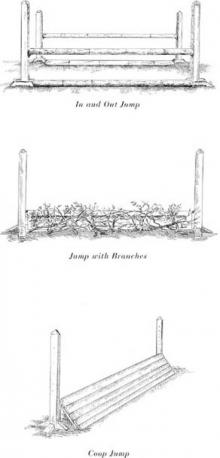 The Georges and the Jewels
The Georges and the Jewels Pie in the Sky: Book Four of the Horses of Oak Valley Ranch
Pie in the Sky: Book Four of the Horses of Oak Valley Ranch Duplicate Keys
Duplicate Keys Charles Dickens
Charles Dickens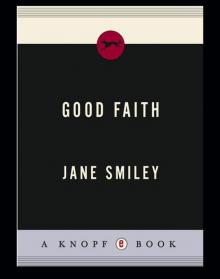 Good Faith
Good Faith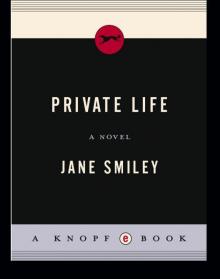 Private Life
Private Life A Thousand Acres: A Novel
A Thousand Acres: A Novel The Greenlanders
The Greenlanders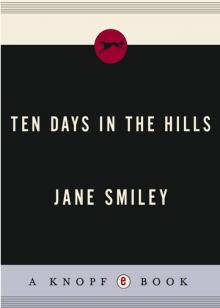 Ten Days in the Hills
Ten Days in the Hills Gee Whiz: Book Five of the Horses of Oak Valley Ranch
Gee Whiz: Book Five of the Horses of Oak Valley Ranch A Thousand Acres
A Thousand Acres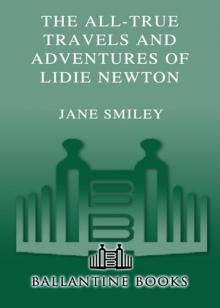 The All-True Travels and Adventures of Lidie Newton
The All-True Travels and Adventures of Lidie Newton Ordinary Love and Good Will
Ordinary Love and Good Will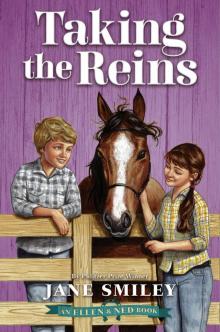 Taking the Reins (An Ellen & Ned Book)
Taking the Reins (An Ellen & Ned Book) The Man Who Invented the Computer
The Man Who Invented the Computer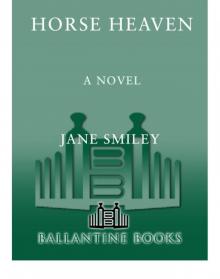 Horse Heaven
Horse Heaven The Age of Grief
The Age of Grief Riding Lessons
Riding Lessons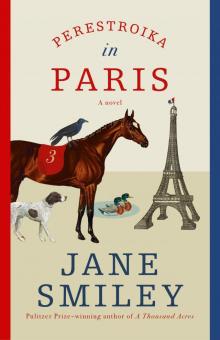 Perestroika in Paris
Perestroika in Paris A Good Horse: Book Two of the Horses of Oak Valley Ranch
A Good Horse: Book Two of the Horses of Oak Valley Ranch Saddles & Secrets (An Ellen & Ned Book)
Saddles & Secrets (An Ellen & Ned Book)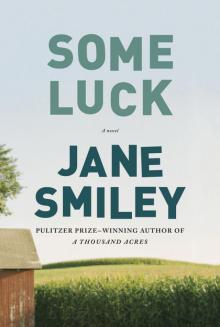 Some Luck: A Novel
Some Luck: A Novel Champion Horse
Champion Horse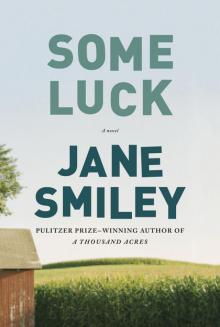 Some Luck
Some Luck Gee Whiz
Gee Whiz Barn Blind
Barn Blind A Thousand Acres (1992 Pulitzer Prize)
A Thousand Acres (1992 Pulitzer Prize) Pie in the Sky
Pie in the Sky True Blue
True Blue A Thousand Acres_A Novel
A Thousand Acres_A Novel A Good Horse
A Good Horse